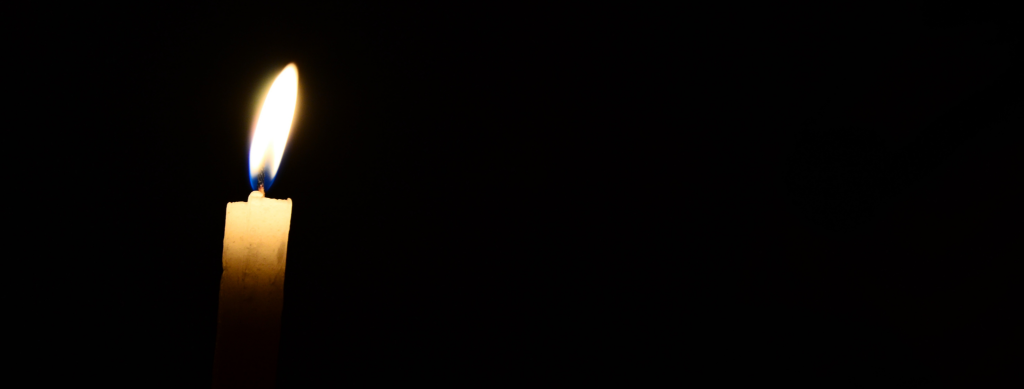
For those of us who follow the church calendar, we have entered the season of Advent, four weeks of preparing our hearts and homes to welcome God anew in our midst.
Anticipating, waiting, preparing, and wondering: these are the marks of Advent living and the dispositions that Advent rituals (candles, wreaths, calendars, and carols) work in us. They make us a people who anticipate the full coming of God’s love in Christ; who prepare and wait for that coming; and then who receive that coming, in whatever form, with wonder and delight.
Advent, however, is not cheery, and for this I’m relieved. I don’t need life to be sugar-coated; it fails to comfort. Proverbial rose-colored glasses distort the landscape of our lives and keep us from seeing shades of gray and their inherent beauty. Advent coincides with the darkest time of the year. The days are short and the nights are long (at least in this part of the world), reminding us that the One who comes into the world, the One for whom we are waiting, is a light shining in the darkness. In addition, Advent readings include apocalyptic Bible passages portraying a world in chaos, insecurity, uncertainty, and volatility: the heavens and earth disappearing; lands blazing with fire; the sun, moon, stars, and seas convulsing in distress; nations in turmoil; and, people living in fear.
It sounds a lot like 2020.
The good news: this is the world into which Christ comes again and again. The challenging news: it is not easy to anticipate, prepare, or wait for this coming when we are so afraid collectively.
Advent occurs in the context of a “little apocalypse.” This means that we don’t deny pain and suffering, injustice and devastation. We don’t say with cavalier triumphalism, “I’m not worried about COVID. God will protect me.” Or, “it’s just another version of the flu,” when it has taken nearly 280,000 lives in the United States alone. The juxtaposition of Advent and Apocalypse calls for a more realistic acknowledgement of our predicament. Honesty of this sort paradoxically frees us to mourn and to anticipate goodness coming to us and the world.
Advent holds us back from plunging into despair. We might lament (again and again), nevertheless we anticipate God’s blessings bestowed upon us and upon ALL. Somehow, by grace, we still believe that God will do what God said: turn sorrow into joy; sickness into health; injustice into righteousness; captivity into freedom.
Jan Richardson beautifully captures this dynamic in her Advent poem, “Blessing When the World is Ending:”
Look, the world
is always ending
somewhere.
Somewhere
the sun has come
crashing down.
Somewhere
it has gone
completely dark.
Somewhere
it has ended
with the gun,
the knife,
the fist.
Somewhere
it has ended
with the slammed door,
the shattered hope.
Somewhere
it has ended
with the utter quiet
that follows the news
from the phone,
the television,
the hospital room.
Somewhere
it has ended
with a tenderness
that will break
your heart.
But, listen,
this blessing means
to be anything
but morose.
It has not come
to cause despair.
It is simply here
because there is nothing
a blessing
is better suited for
than an ending,
nothing that cries out more
for a blessing
than when a world
is falling apart.
This blessing
will not fix you,
will not mend you,
will not give you
false comfort;
it will not talk to you
about one door opening
when another one closes.
It will simply
sit itself beside you
among the shards
and gently turn your face
toward the direction
from which the light
will come,
gathering itself
about you
as the world begins
again.
In this season, we are invited to anticipate blessings in ordinary and extraordinary expressions of goodness, truth, and beauty. We are invited to honestly acknowledge our personal and collective loss, trauma, and disorientation. We are invited to pray, simply and gentling turning our faces toward light and life and love. If all is too bleak or we cannot bear to crane our necks one more time, then it is time to allow others to sit with us and anticipate for us. Not unlike parents do for their children. Occasionally my daughter’s big feelings threaten to overwhelm her. She’s grieved (sometimes for very good reason) and all of life seems unfair. I try to respond with empathy and then a gentle reminder of all the good surrounding us. I often look around our home for her, placing my gaze on the signs of love and joy in our midst, until she can do the same.
Perhaps this ought to be our 2020 Advent ritual: holding vigil together, over Zoom and phone calls and digitally mediated church services, courageously gazing and anticipating the Light to pierce the darkness of this year; waiting together with confidence and remembering that Jesus, the Light and Life and Love of God, has already come into the world and promises to come again in the here-and-now.
*Theresa F. Latini, Ph.D. is the Executive Director of Mount Olivet Conference & Retreat Center and an ordained minister in the Presbyterian Church (USA)